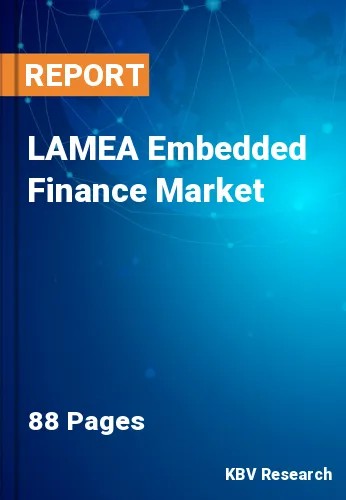The Latin America, Middle East and Africa Embedded Finance Market would witness market growth of 35.7% CAGR during the forecast period (2023-2029).
Financial services are made more practical and accessible through financial inclusion, which is supported through embedded finance. For instance, users can use their cell phones to access financial products and services whenever and from any place by integrating financial services into mobile apps. Banking inclusion has the potential to aid developing countries, where many rural residents lack access to conventional brick-and-mortar banking institutions.
Through the creation of new avenues for the delivery of financial services, embedded finance also advances financial inclusion. Particular demographics, such as low-income people, people living in rural areas, and small enterprises, are frequently challenging for traditional financial institutions to contact. By incorporating financial services into non-financial goods and services, embedded finance can offer new methods to reach disadvantaged groups with financial services. Additionally, it might heighten competition in the financial services industry, improving the quality of the goods and services offered to clients. Customers can quickly compare and select from various financial products and services, for instance, leading to better deals and better client results.
The UAE has been closely and fast following global trends in BFSI digitalization. When it comes to developing banking trends and technology, the Middle East region—and the United Arab Emirates in particular—are expanding and prospering marketplaces. The Middle East region is well-positioned to grow into the following major market for digital banking innovation in terms of untapped potential.
Middle Eastern countries are finally acknowledging the critical need for digital services that meet their needs. They are loosening the laws and regulations to keep up with changing market trends. For cashless transactions to become the new standard, regulations must be revised. As a result, the LAMEA region would see a surge in the market.
The Brazil market dominated the LAMEA Embedded Finance Market by Country in 2022 and would continue to be a dominant market till 2029; thereby, achieving a market value of $7,560.2 Million by 2029. The Argentina market is registering a CAGR of 36.5% during (2023 - 2029). Additionally, The UAE market would generate a CAGR of 35.4% during (2023 - 2029).
Based on End-use, the market is segmented into Retail, Travel & Entertainment, Manufacturing, Logistics, Healthcare and Others. Based on Business Model, the market is segmented into B2B, B2C, B2B2B and B2B2C. Based on Type, the market is segmented into Embedded Payment, Embedded Insurance, Embedded Investment, Embedded Lending and Embedded Banking. Based on countries, the market is segmented into Brazil, Argentina, UAE, Saudi Arabia, South Africa, Nigeria, and Rest of LAMEA.
Free Valuable Insights: The Worldwide Embedded Finance Market is Projected to reach USD 384.8 Billion by 2029, at a CAGR of 30.0%
The market research report covers the analysis of key stake holders of the market. Key companies profiled in the report include Stripe, Inc., Finastra Group Holdings Limited (Vista Equity Partners), Zopa Bank Limited, Fidelity Information Services (FIS), Inc. (Payrix Solutions, LLC), Transcard Payments, LLC, Fluenccy Pty Ltd., Cybrid Technology Inc., Walnut Insurance Inc., Fortis Payment Systems, LLC, and Lendflow Inc.
By End-use
By Business Model
By Type
By Country
Our team of dedicated experts can provide you with attractive expansion opportunities for your business.

